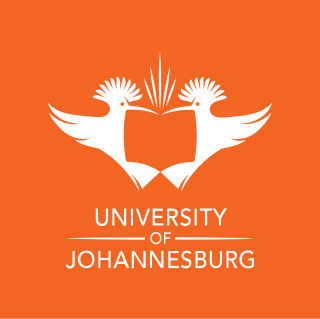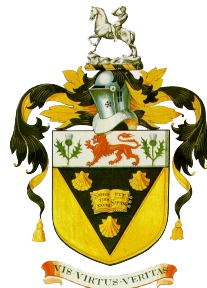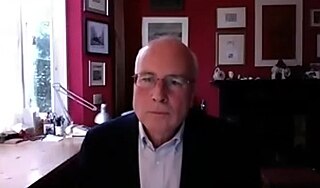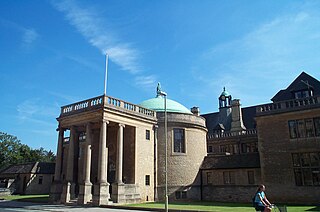Related Research Articles
The United World Colleges (UWC) is an international network of schools and educational programmes with the shared aim of "making education a force to unite people, nations and cultures for peace and a sustainable future." The organisation was founded on the principles of German educator Kurt Hahn in 1962 to promote intercultural understanding.

The University of the Witwatersrand, Johannesburg, commonly known as Wits University or Wits, is a multi-campus public research university situated in the northern areas of central Johannesburg, South Africa. The university has its roots in the mining industry, as do Johannesburg and the Witwatersrand in general. Founded in 1896 as the South African School of Mines in Kimberley, it is the third oldest South African university in continuous operation.

The University of Johannesburg, colloquially known as UJ, is a public university located in Johannesburg, South Africa. The University of Johannesburg was established on 1 January 2005 as the result of a merger between the Rand Afrikaans University (RAU), the Technikon Witwatersrand (TWR) and the Soweto and East Rand campuses of Vista University. Prior to the merger, the Daveyton and Soweto campuses of the former Vista University had been incorporated into RAU. As a result of the merger of Rand Afrikaans University (RAU), it is common for alumni to refer to the university as RAU.

Rhodes University is a public research university located in Makhanda in the Eastern Cape Province of South Africa. It is one of four universities in the province.
Rupert Taylor, is a professor of political studies and former head of the Department of Political Studies at the University of the Witwatersrand, Johannesburg, from 1987 to 2013. He was educated at the progressive independent Dartington Hall School in England and completed a BA degree in politics and government at the University of Kent in 1980, followed by an MSc at the London School of Economics (1981) and a PhD in sociology at Kent, (1986). He was formerly a visiting research fellow in the Department of Political Science at the New School for Social Research in New York City, adjunct professor in the Department of Political Science at Columbia University and a visiting research fellow in the School of Politics, Queen's University Belfast.
Mark Behr was a Tanzanian-born writer who grew up in South Africa. He was professor of English literature and creative writing at Rhodes College, Memphis, Tennessee. He also taught in the MA program at the University of the Witwatersrand in Johannesburg, South Africa.

Sibusiso Mandlenkosi Emmanuel Bengu was a South African politician.

Charles Rees Howard Tripp, is an academic and author specializing in the politics and history of the Near and Middle East.
Tshilidzi Marwala is a South African artificial intelligence engineer, a computer scientist, a mechanical engineer and a university administrator. He is currently Rector of the United Nations University and UN Under-Secretary-General. In August 2023 Marwala was appointed to the United Nations scientific advisory council.

Adam Mahomed Habib is a South African academic administrator serving as Director of the School of Oriental and African Studies, University of London since 1 January 2021. He served as Vice-Chancellor and Principal of the University of the Witwatersrand (Wits) in Johannesburg, South Africa, between 1 June 2013, when the term of his predecessor Loyiso Nongxa ended, and 1 January 2021. He is also a former deputy vice-chancellor of the University of Johannesburg.
Michael Neocosmos is a South African Marxist philosopher. He is an emeritus professor in humanities at Rhodes University, Distinguished Visiting Scholar at the University of Connecticut Humanities Institute and a fellow at the Centre for Humanities Research at the University of the Western Cape.

Rhodes House is a building part of the University of Oxford in England. It is located on South Parks Road in central Oxford, and was built in memory of Cecil Rhodes, an alumnus of the university and a major benefactor. It is listed Grade II* on the National Heritage List for England.
Loyiso Nongxa is a South African mathematician, the current chairperson of the National Research Foundation of South Africa (NRF) and a former Vice-Chancellor and Principal of the University of the Witwatersrand, Johannesburg (Wits).
Lucien van der Walt is a South African writer, professor of Sociology and labour educator. His research engages the anarchist/syndicalist tradition of Mikhail Bakunin and Peter Kropotkin; trade unionism and working class history, particularly in southern Africa; and neoliberal state restructuring. He currently teaches and researches at Rhodes University in the Eastern Cape, South Africa, and previously worked at the University of the Witwatersrand. His 2007 PhD on anarchism and syndicalism in South Africa in the early 1900s won both the international prize for the best PhD dissertation from the Labor History journal, and the Council for the Development of Social Science Research in Africa prize for best African PhD thesis.
Bernard Lewis Fanaroff is a South African astronomer and trade unionist. He served in several positions in the South African government from 1994 to 2000 related to the Reconstruction and Development Programme, the RDP, and to Safety and Security.From 2003 to 2015 he led South Africa's bid to host the Square Kilometre Array Radio Telescope, the SKA, in Africa and the design and construction of the MeerKAT radio telescope. He is the co-developer of the Fanaroff–Riley classification, a method of classifying radio galaxies. He was the Project Director of South Africa's Square Kilometre Array bid.
The Johannesburg Institute for Advanced Study (JIAS), launched in 2015, is a collaborative initiative involving the University of Johannesburg (UJ) in South Africa and Nanyang Technological University (NTU) in Singapore.
Keith Breckenridge is a South African professor of history at the University of the Witwatersrand. He is a specialist in the cultural and economic history of South Africa, particularly the gold mining industry, and the development of information systems such as birth, marriage and death registration and identity verification systems.

Irvy (Igle) Gledhill is a South African physicist at the University of Witwatersrand, School of Mechanical, Industrial & Aeronautical Engineering, in Johannesburg.
David Ewart George Boucher is a Welsh political theorist and philosopher of international relations.
References
- 1 2 "Peter Vale | Who's Who SA". Whoswho.co.za. Retrieved 29 July 2015.
- ↑ "Humanities key to our republic". Archived from the original on 29 November 2015. Retrieved 28 July 2015.
- ↑ Vale, P. 2003. Security and Politics in South Africa: The Regional Dimension. Boulder, Colorado: Lynne Rienner Publishers[ page needed ]
- ↑ "Aberystwyth University - March". Aber.ac.uk. 14 March 2013. Retrieved 29 July 2015.[ permanent dead link ]
- ↑ Buthelezi, M & Vale, P (eds.) 2023. State Capture in South Africa. How and why it happened. Johannesburg: Wits University Press Routledge[ page needed ]